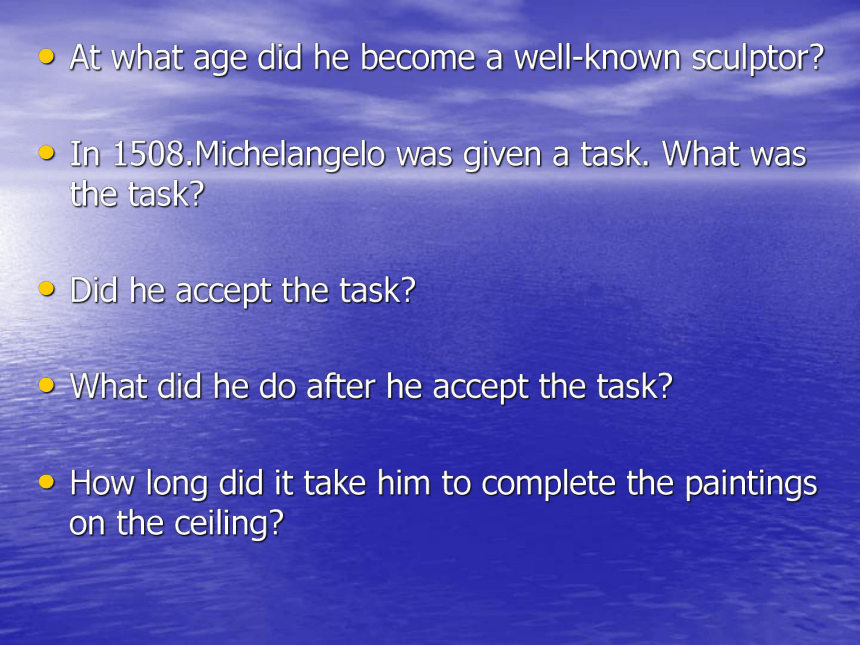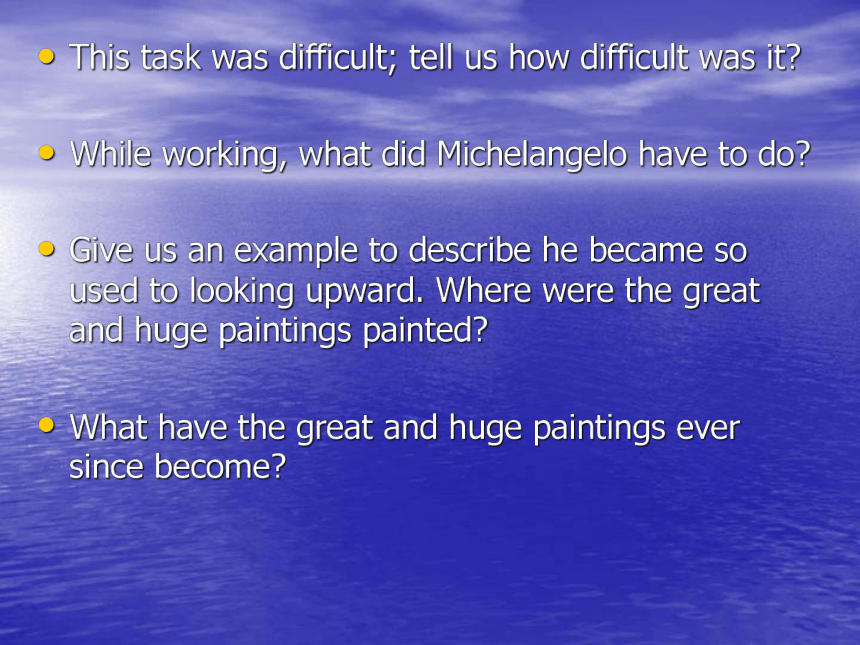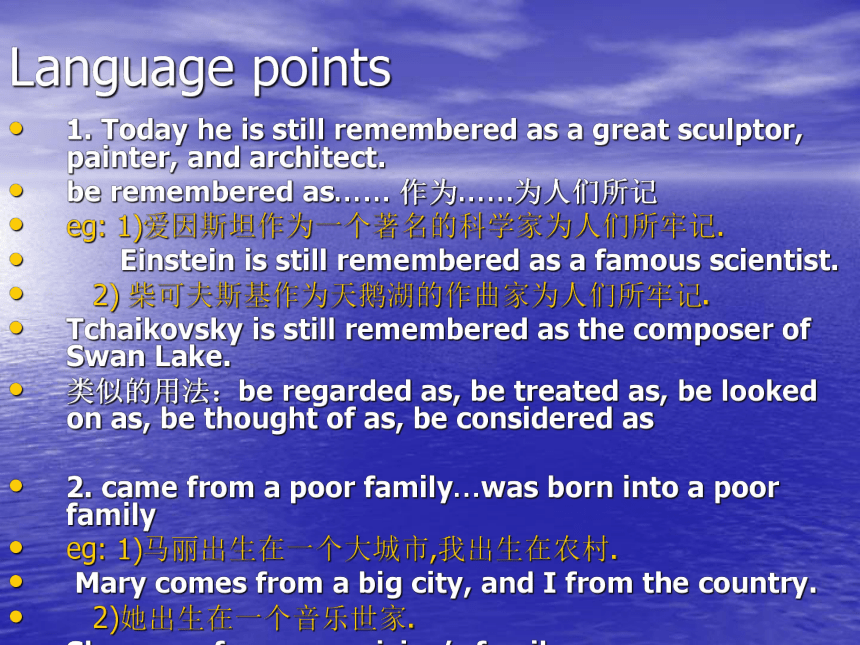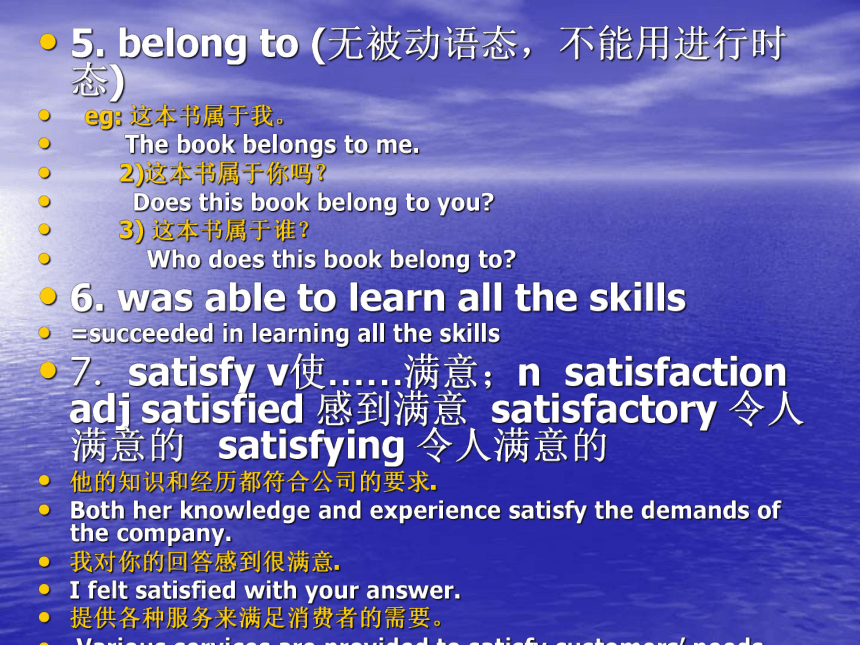高中英语 unit2 success stories-reading课件 上海新世纪版S1A
文档属性
| 名称 | 高中英语 unit2 success stories-reading课件 上海新世纪版S1A |

|
|
| 格式 | zip | ||
| 文件大小 | 113.3KB | ||
| 资源类型 | 教案 | ||
| 版本资源 | 上海新世纪版 | ||
| 科目 | 英语 | ||
| 更新时间 | 2013-12-10 00:00:00 | ||
图片预览









文档简介
课件22张PPT。Unit TwoSuccess storiesQuestionsWhat nationality is Michelangelo?
What is he still remembered as?
What kind of family was Michelangelo born into?
What did Michelangelo do at an early age?
When did Michelangelo start to work and learn in a workshop?
Whom did the workshop belong to?
Was Michelangelo able to learn all the skills of sculpture in the workshop?
In this way, he wasn’t satisfied, was he?
What did he do then?
How did Michelangelo work?
At what age did he become a well-known sculptor?
In 1508.Michelangelo was given a task. What was the task?
Did he accept the task?
What did he do after he accept the task?
How long did it take him to complete the paintings on the ceiling?
This task was difficult; tell us how difficult was it?
While working, what did Michelangelo have to do?
Give us an example to describe he became so used to looking upward. Where were the great and huge paintings painted?
What have the great and huge paintings ever since become?
Did Michelangelo leave us with a small number of sculptures and paintings?
Who must learn from his works today?
What is the reflection of visitors to such tourist attractions?
Language points1. Today he is still remembered as a great sculptor, painter, and architect.
be remembered as…… 作为……为人们所记
eg: 1)爱因斯坦作为一个著名的科学家为人们所牢记.
Einstein is still remembered as a famous scientist.
2) 柴可夫斯基作为天鹅湖的作曲家为人们所牢记.
Tchaikovsky is still remembered as the composer of Swan Lake.
类似的用法:be regarded as, be treated as, be looked on as, be thought of as, be considered as
2. came from a poor family…was born into a poor family
eg: 1)马丽出生在一个大城市,我出生在农村.
Mary comes from a big city, and I from the country.
2)她出生在一个音乐世家.
She came from a musician’s family.3. at an early age
eg: 1) 很小就在国外学习不一定就好.
Studying abroad at an early age is not always good.
2)有人认为一个人应该很早就开始学英语,但另一些人不这么认为.
Some people think one should begin to learn English at an early age, but others don’t think so.
3) 智慧随着年龄增长。
Wisdom grows with age.
be of an age同岁 ,
in the digital/computer/electronic/stone/space age 在数字、计算机、电子,石器,太空时代,
of the age当代的
4. any other craftsman in Italy (except Michelangelo)
any craftsman in Italy ( including Michelangelo)
5. belong to (无被动语态,不能用进行时态)
eg: 这本书属于我。
The book belongs to me.
2)这本书属于你吗?
Does this book belong to you?
3) 这本书属于谁?
Who does this book belong to?
6. was able to learn all the skills
=succeeded in learning all the skills
7.satisfy v使……满意;n satisfaction adj satisfied 感到满意 satisfactory 令人满意的 satisfying 令人满意的
他的知识和经历都符合公司的要求.
Both her knowledge and experience satisfy the demands of the company.
我对你的回答感到很满意.
I felt satisfied with your answer.
提供各种服务来满足消费者的需要。
Various services are provided to satisfy customers’ needs.
8.by the time he was thirty
到他十八岁时,他已经学了十年英语了.
By the time he was 18, he had learned English for ten years.
到他十八岁时,他将已经学了十年英语了.
By the time he is 18, he will have learned English for ten years.
到他十五岁时,他已经决定环游世界了
By the age of 15, he had already determined to travel around the world.
9. be regarded as被认为是
曼德拉被认为是南非的英雄。
Mandela is regarded as a hero of South Africa.
亚伯拉罕林肯至今仍被认为是美国最伟大的总统之一。
Abraham Lincoln is still regarded as one of the greatest American presidents to this day.
10. turn down拒绝;关闭
如果我的邀请被拒绝了我将感到很难过的
I would feel sorry if my invitation is turned down.
我关闭了空调.
I turned down the air-conditioner.
他的要求被拒绝了.
His request was turned down.
11.not…but…不是……而是……
他不是一个作家,而是一个音乐家.
He is not a writer but a musician.
他射中的不是一头狮子而是十只.
He shot not a lion but ten. 12. agree
agree to do同意做
他同意让我早点儿回家.
He agreed to let me go home early.
agree to sth 同意,赞同,宾语时某个具体的建议、计划、安排
他打算同意我们的建议吗?
Is he going to agree to our suggestion?
agree with sb. 跟…有相同的看法,跟人或意见、分析、想法或what….
你同意我说的话吗?
Do you agree with what I’ve said ?
He agreed with your opinion.
agree on sth. 就某事达成协议
我们就会议的日期达成协议.
We all agreed on the date of the conference.
agree that 一致同意,一致认为
我们每个人一致认为有必要再开一次会.
Every one of us agreed that another meeting was necessary.
13.Shut himself up
关门窗
shut up the house
十点打佯
shut the shop at ten
闭嘴!
Shut up!
14..alone 单独的(只作表语或宾补,不作前置定语);仅仅(放在名词或代词后)
别管我。
Just leave me alone.
仅仅这双鞋就花了1000元。
The shoes alone cost 1,000 yuan.
他独自一人住在那所大房子里.
He lives alone in that large house.
15.It takes sb time to do sth.=It takes time for sb to do sth.
学生们通常每天要花两个小时完成他们的作业.
It usually takes students two hours to finish their homework every day.
It usually takes two hours for students to finish their homework every day.
16.think/consider/feel/find/discover/believe/make it +adj/n that/for sb to do sth.
我们认为我们学生学好英语是重要的。
We think it important for us students to learn English well.
有人感到掌握好英语语法很难。
Someone feels it hard to master English grammar well.17. imagine
我们无法想象工作没有计算机。
We can’t imagine working without computer.
我无法想象他成为了一个政治家。
I can’t imagine him becoming a politician.
你能想象没有电的生活吗?
Can you imagine life without electricity.
18. lonely
一个人独自生活在国外可能会感到孤独。
Living alone in a foreign country may feel lonely.
我独自住在一个偏僻的房子里,但我从没感到孤独。
I live alone in a lonely house, but I never feel lonely19. lie on his back lonely.
lie on his face 仰卧 lie on his side 侧卧
stand on one foot 一只脚站立
20. He became so used to looking upward.
be /become/ get used to sth / doing sth习惯(做)某事
他很快就习惯了大学生活。
He soon got used to college life.
三星期后他已经习惯这种食品了。
After three weeks, he has got used to the food.
used to do 过去常常做
我过去常常起床晚,但现在我习惯早起了。
I used to get up late, but now I am used to early rise.
be used to do被用来做
这种木材被用来造纸。
This kind of wood is used to make paper.
在泰国,大象被用来取悦游客。
Elephants are used to entertain tourists in Thailand.21. ever since
自从他去了伦敦后我非常想念他。
He left for London last week and I have missed him ever since.
I have missed him ever since he left for London.
22. Leave sb with sth.给某人留下某物
1.他留下一大笔钱给他的孩子
He left his children with a large sum of money.
2.为给佣人留下一张条子。
I left the servant with a message.23. a great number of 大量的(后跟可数名词复数,作主语时动词用复数)
许多漫画家正在为孩子们制作电影。
A great number of cartoonists are working for the films for children.
许多大学生自愿献血。
A great number of university students volunteer to donate blood.
the number of …的数量 (后跟可数名词复数,作主语时动词用单数) *
The number of the students in our school is increasing.24.can’t help but do sth
=can’t but do
看到这种情况他只有哭着求助。
He couldn’t help but cry for help at the sight.
He couldn’t but cry for help at the sight.
Cannot help (to) do sth./do sth. 不能帮助做
我很忙,不能帮你做任何事。
I’m so busy that I can’t help do anything for you.
Cannot help doing sth. 情不自禁
听到她父母亲不幸在车祸中遇难的消息时,她情不自禁地哭了起来。
Hearing that her parents were killed in the road accident, she couldn’t help crying.
What is he still remembered as?
What kind of family was Michelangelo born into?
What did Michelangelo do at an early age?
When did Michelangelo start to work and learn in a workshop?
Whom did the workshop belong to?
Was Michelangelo able to learn all the skills of sculpture in the workshop?
In this way, he wasn’t satisfied, was he?
What did he do then?
How did Michelangelo work?
At what age did he become a well-known sculptor?
In 1508.Michelangelo was given a task. What was the task?
Did he accept the task?
What did he do after he accept the task?
How long did it take him to complete the paintings on the ceiling?
This task was difficult; tell us how difficult was it?
While working, what did Michelangelo have to do?
Give us an example to describe he became so used to looking upward. Where were the great and huge paintings painted?
What have the great and huge paintings ever since become?
Did Michelangelo leave us with a small number of sculptures and paintings?
Who must learn from his works today?
What is the reflection of visitors to such tourist attractions?
Language points1. Today he is still remembered as a great sculptor, painter, and architect.
be remembered as…… 作为……为人们所记
eg: 1)爱因斯坦作为一个著名的科学家为人们所牢记.
Einstein is still remembered as a famous scientist.
2) 柴可夫斯基作为天鹅湖的作曲家为人们所牢记.
Tchaikovsky is still remembered as the composer of Swan Lake.
类似的用法:be regarded as, be treated as, be looked on as, be thought of as, be considered as
2. came from a poor family…was born into a poor family
eg: 1)马丽出生在一个大城市,我出生在农村.
Mary comes from a big city, and I from the country.
2)她出生在一个音乐世家.
She came from a musician’s family.3. at an early age
eg: 1) 很小就在国外学习不一定就好.
Studying abroad at an early age is not always good.
2)有人认为一个人应该很早就开始学英语,但另一些人不这么认为.
Some people think one should begin to learn English at an early age, but others don’t think so.
3) 智慧随着年龄增长。
Wisdom grows with age.
be of an age同岁 ,
in the digital/computer/electronic/stone/space age 在数字、计算机、电子,石器,太空时代,
of the age当代的
4. any other craftsman in Italy (except Michelangelo)
any craftsman in Italy ( including Michelangelo)
5. belong to (无被动语态,不能用进行时态)
eg: 这本书属于我。
The book belongs to me.
2)这本书属于你吗?
Does this book belong to you?
3) 这本书属于谁?
Who does this book belong to?
6. was able to learn all the skills
=succeeded in learning all the skills
7.satisfy v使……满意;n satisfaction adj satisfied 感到满意 satisfactory 令人满意的 satisfying 令人满意的
他的知识和经历都符合公司的要求.
Both her knowledge and experience satisfy the demands of the company.
我对你的回答感到很满意.
I felt satisfied with your answer.
提供各种服务来满足消费者的需要。
Various services are provided to satisfy customers’ needs.
8.by the time he was thirty
到他十八岁时,他已经学了十年英语了.
By the time he was 18, he had learned English for ten years.
到他十八岁时,他将已经学了十年英语了.
By the time he is 18, he will have learned English for ten years.
到他十五岁时,他已经决定环游世界了
By the age of 15, he had already determined to travel around the world.
9. be regarded as被认为是
曼德拉被认为是南非的英雄。
Mandela is regarded as a hero of South Africa.
亚伯拉罕林肯至今仍被认为是美国最伟大的总统之一。
Abraham Lincoln is still regarded as one of the greatest American presidents to this day.
10. turn down拒绝;关闭
如果我的邀请被拒绝了我将感到很难过的
I would feel sorry if my invitation is turned down.
我关闭了空调.
I turned down the air-conditioner.
他的要求被拒绝了.
His request was turned down.
11.not…but…不是……而是……
他不是一个作家,而是一个音乐家.
He is not a writer but a musician.
他射中的不是一头狮子而是十只.
He shot not a lion but ten. 12. agree
agree to do同意做
他同意让我早点儿回家.
He agreed to let me go home early.
agree to sth 同意,赞同,宾语时某个具体的建议、计划、安排
他打算同意我们的建议吗?
Is he going to agree to our suggestion?
agree with sb. 跟…有相同的看法,跟人或意见、分析、想法或what….
你同意我说的话吗?
Do you agree with what I’ve said ?
He agreed with your opinion.
agree on sth. 就某事达成协议
我们就会议的日期达成协议.
We all agreed on the date of the conference.
agree that 一致同意,一致认为
我们每个人一致认为有必要再开一次会.
Every one of us agreed that another meeting was necessary.
13.Shut himself up
关门窗
shut up the house
十点打佯
shut the shop at ten
闭嘴!
Shut up!
14..alone 单独的(只作表语或宾补,不作前置定语);仅仅(放在名词或代词后)
别管我。
Just leave me alone.
仅仅这双鞋就花了1000元。
The shoes alone cost 1,000 yuan.
他独自一人住在那所大房子里.
He lives alone in that large house.
15.It takes sb time to do sth.=It takes time for sb to do sth.
学生们通常每天要花两个小时完成他们的作业.
It usually takes students two hours to finish their homework every day.
It usually takes two hours for students to finish their homework every day.
16.think/consider/feel/find/discover/believe/make it +adj/n that/for sb to do sth.
我们认为我们学生学好英语是重要的。
We think it important for us students to learn English well.
有人感到掌握好英语语法很难。
Someone feels it hard to master English grammar well.17. imagine
我们无法想象工作没有计算机。
We can’t imagine working without computer.
我无法想象他成为了一个政治家。
I can’t imagine him becoming a politician.
你能想象没有电的生活吗?
Can you imagine life without electricity.
18. lonely
一个人独自生活在国外可能会感到孤独。
Living alone in a foreign country may feel lonely.
我独自住在一个偏僻的房子里,但我从没感到孤独。
I live alone in a lonely house, but I never feel lonely19. lie on his back lonely.
lie on his face 仰卧 lie on his side 侧卧
stand on one foot 一只脚站立
20. He became so used to looking upward.
be /become/ get used to sth / doing sth习惯(做)某事
他很快就习惯了大学生活。
He soon got used to college life.
三星期后他已经习惯这种食品了。
After three weeks, he has got used to the food.
used to do 过去常常做
我过去常常起床晚,但现在我习惯早起了。
I used to get up late, but now I am used to early rise.
be used to do被用来做
这种木材被用来造纸。
This kind of wood is used to make paper.
在泰国,大象被用来取悦游客。
Elephants are used to entertain tourists in Thailand.21. ever since
自从他去了伦敦后我非常想念他。
He left for London last week and I have missed him ever since.
I have missed him ever since he left for London.
22. Leave sb with sth.给某人留下某物
1.他留下一大笔钱给他的孩子
He left his children with a large sum of money.
2.为给佣人留下一张条子。
I left the servant with a message.23. a great number of 大量的(后跟可数名词复数,作主语时动词用复数)
许多漫画家正在为孩子们制作电影。
A great number of cartoonists are working for the films for children.
许多大学生自愿献血。
A great number of university students volunteer to donate blood.
the number of …的数量 (后跟可数名词复数,作主语时动词用单数) *
The number of the students in our school is increasing.24.can’t help but do sth
=can’t but do
看到这种情况他只有哭着求助。
He couldn’t help but cry for help at the sight.
He couldn’t but cry for help at the sight.
Cannot help (to) do sth./do sth. 不能帮助做
我很忙,不能帮你做任何事。
I’m so busy that I can’t help do anything for you.
Cannot help doing sth. 情不自禁
听到她父母亲不幸在车祸中遇难的消息时,她情不自禁地哭了起来。
Hearing that her parents were killed in the road accident, she couldn’t help crying.
